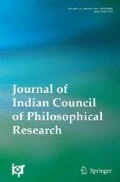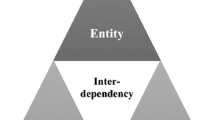Abstract
The nature of Self is ever-blissful, yet we feel constant pains and sufferings in the world. Each one of us is forced to face the worldly happenings in every station of our life. These sufferings cannot end without going to their root cause and finding a solution for it. The cause of these sufferings, as put by most of the schools of Indian Philosophy, is ignorance about the nature of Self that results in bondage. All the schools of Indian Philosophy, except the Cārvāka, hold that ignorance is the cause of bondage and knowledge begets liberation. Realization of eternal peace or bliss is the goal of almost every school of Indian Philosophy. Here, we must know that Ānanda is of three types—Viṣayānanda, Vidyānanda and Brahmānanda. Viṣayānanda is momentary pleasure, which arises out of the contact of the mind with external objects. It has a difference in degrees. Vidyānanda is the pleasure that we derive from the feeling that “I have achieved all that was to be achieved”. It is still of the form of a mental mode. Brahmānanda is eternal bliss, which is discovered when avidyā is annihilated by akhandākāra mental mode. It is beyond mind and its modifications. The views of the Bhagavadgītā, Upaniṣad, and the elementary texts written by the proponents of the philosophy of non-dualism expound that the way to achieve the state of bliss is by inculcating the attitude of absolute detachment which, when achieved, makes a short work of our ignorance about Brahman. The paper tries to discuss all these issues and the Bliss aspect of Brahman with relevant references. It would be a success if it clarifies the different aspects of Ānanda and creates genuine interest in the researchers to further study the references for deeper understanding of bliss aspect of Brahman.
Similar content being viewed by others
Notes
Pañcadaśī 11/11.
Praśastapāda Bhāṣya on Nyāya Sūtra.
Tarka Saṅgrahah of Annaṁbhatta tr. By Kanshi Rāma, Delhi: Motilal Banarssidass, 2007, p. 214.
Bhagavadgītā 14/6,9.
Vivekacūḍāmaṇi 106.
Bhagavadgītā 6 /22–23.
Bṛhadāraṇyaka Upaniṣad 4/3/32.
A Constructive Survey of Upaniṣadic Philosophy, R. D. Rānāde, Oriental Book Agency, Poona, 1926, p. 300.
Vivekacūḍāmaṇi 207–211.
Ibid 111–116.
Bhagavadgītā 5/22.
Chāndogya Upaniṣad 7/1/3.
Pañcadaśī 11/2.
Chāndogya Upaniṣad 7/13/1, 7/14/1.
Vivekacūḍāmaṇi 87–91.
“Sukhamasti viraktasya munerekāntajīvīnaḥ” Padma Purāṇ̣a, Uttarakhaṇda, Ch 4, verse-75.
Aṣtāvakra-Gītā 1/2.
Bhagavadgītā 3/36–41, 5/15–17.
Ibid 16/1.
Vairāgya Sataka of Bhartṛhari 7.
Taittirīya Upaniṣad 2/4/1.
Ibid 2/4/1.
Ibid 2/7/1.
Ibid 3/6/1.
Advaita Makaranda verse 2.
Muṇḍaka Upaniṣad 2/2/11.
Taittirīya Upaniṣad 2/6.
Bhagavadgītā 7/19.
Chāndogya Upaniṣad 3/14/1.
Śrī Rāmacaritamānasa Ayodhyākāṅḍa verse 87.
Ibid 117.
Ibid Īśvara aṁśa jīva avinaśī, chetan amala sahaja sukhrāśī. So māyā basa bhayo gosaī, badhyo kīṭa markaṭa kī naī.
Pañcadaśī Ch. 1 verse 8.
Ibid 9.
Bṛhadāraṇyaka Upaniṣad 2/4/5.
Ibid 29.
Bhagavadgītā 5/23.
Ibid 18/54.
Ibid 6/17.
Kaṭha Upaniṣad 1/2/8.
Chāndogya Upaniṣad 6/14/2.
Kaṭha Upaniṣad 1/2/9.
“saṁprāpte sannihite kale nahi nahi rakṣati dukṛñkaraṇe”- Bhaja-Govindaṁ verse 1.
Vivekacūḍāmaṇi 60–61.
Bhagavadgītā 6/27–28.
Ibid 2/55.
Bṛhadāraṇyaka Upaniṣad 4/4/12.
Śvetāśvatara Upaniṣad 3/8,13, 6/20, Pañcadaśī 11/8.
Kaṭha Upaniṣad 2/2/12.
Svāmī Tapovanam, Guidance From the Guru, Mumbai: CCMT, letter-4, p.13.
References
Ādi, Ś.(2000). Bhaja-Govindam (Commentary by Svāmī Chinmayānanda), Mumbai: Central Chinmaya Mission Trust.
Ādi, Ś. (2008). Vivekacūḍāmaṇi (Commentary by Jagadguru Śaṅkara Bhārati and Ts. by P. Śaṅkaranārayaṇa), Mumbai: Bhartiya Vidya Bhavan, 5th edition.
Bhartṛhari. (2014). Bhartṛhari Śataka Traya, (Ts by Sunīla Śarmā) Delhi: Manoj Publication.
Dāsa, T. (2000). Śrī Rāmacaritamānasa, Gorakhpur: Gitapress.
Gambhīrananda, S. (1989). Eight Upanishads, (Ts.) Vol. I-II, Kolkata: Advaita Ashram.
Giri, V. (2000) Bṛhadāraṇyaka Upaniṣad (Śāṅkara Bhāṣya and Ānanda Giri Ṭīkā), Rishikesh: Kailaśh Ashram.
Giri, V. (2000) Chāndogya Upaniṣad (Śāṅkara Bhāṣya and Ānanda Giri Ṭīkā), Rishikesh: Kailaśh Ashram.
Giri, V. (1997). Iśāvasya Upaniṣad (Śāṅkara Bhāṣya and Ānanda Giri Ṭīkā), Rishikesh: Kailaśh Ashram.
Giri, V. (1997). Kaṭhopaniṣad (Śāṅkara Bhāṣya and Ānanda Giri Ṭīkā), Rishikesh: Kailaśh Ashram.
Giri, V. (2000). Taittirīya Upaniṣad (Śāṅkara Bhāṣya and Ānanda Giri Ṭīkā), Rishikesh: Kailaśh Ashram.
Gupta, M. (1990). Śrī Rāmakṛṣṇa Kathāmṛta Vol. I-V, Kolkata: Advaita Ashram.
Lakṣmidhar, K. (2000). Advaita Makaranda, (Commentary by Svāmī Tejomayānanda), Mumbai: Central Chinmaya Mission Trust.
Leggett, T. (2017). Śaṅkara on the Yoga sūtra-s, Delhi: Motilal Banarsidass.
Madhvācharya. (2017). Sarvadarshan Sangrah, (Ts. E. B. Cowell and Archibald Edward Gough) Delhi: Bhartiya kala Prakashan.
Ramaṇa, M. (2000). Ramaṇa Gītā, (Commentary by Svāmī Tejomayānanda) Mumbai: Central Chinmaya Mission Trust.
Sadānanda, S. (2003). Vedānta Sāra, (Commentary by Svāmī Śankarānanda) Kanpur: Central Chinmaya Mission Trust.
Tapovanam, S. (1998). Guidance from the Guru, Mumbai: Central Chinmaya Mission Trust, 1998.
Vidyāraṇya, S. (2005). Pañcadaśī, Part 1–4, (Commentary by Svāmī Śaṅkarānanda), Mumbai: Central Chinmaya Mission Trust.
Vidyāraṇya, S. (2009). Jīvanamukti-Viveka, (Ts. by Svāmī Harṣānanda) Śrī Ramakrishna Matha, Chennai.
Viṣ̣ṇudevānanda, S. (1997). Bhagavadgītā (Śāṅkara Bhāṣya and Ānanda Giri Ṭīkā), Rishikesh: Kailash Ashram, 1st edition.
Vivekānanda, S. (1950). The Complete Works of Svāmī Vivekānanda, Kolkata: Advaita Ashram.
Vyāsa, V. (2010). Śrīmad-Bhāgvata Mahā Purāṇa, (Ts. by C. L. Gosvāmi), Gorakhpur: Gitapress.
Secondary sources
Abhedānanda, S. (1947). Attitude of Vedanta Towards Religion, Kolkata: Ramakrishna Vedanta Math.
Akhandanand, S. (2003). Vedanta Bodha, 3rd edition. Varanasi: Anand Kanan Press.
Devadas, N. (1974). Ānanda-The concept of Bliss in the Upanishads, Madras: The Christian Library System.
Flood, G. (2004). The ascetic life: Subjectivity, Memory and tradition. Cambridge University Press.
Giri, R. (2002). The Philosophy of Puraṇas (with special reference to Śiva Puraṇa), Varanasi: Bhartiya Vidya Sansthan.
Olivelle, P. (2012). Ascetics and Brahman, Delhi: Anthem Press.
Prabhavananada, S. (1960). Spiritual Heritage of India, Madras: Śrī Ramakrishna Math, Mylapore.
Prabhavānanda, S. (1961). Religion in Practice, London: George Allen and Unwin, Ltd.
Puri, S.S. (2008). Sthitaprajna Darsana, Bangalore: Shankarpuram.
Raju, P. T. (1971). The philosophical tradition of India. Oxford University Press.
Ranade, R. D. (1926). A Constructive Survey of Upaniṣadic Philosophy, Poona: Oriental Book Agency.
Roy, S. S. (1982). The heritage of Śaṅkar. Munshiram Manoharlal Publishers.
Sacchidānanda, S. (1997). The Method of the Vedanta, Delhi: Motilal Banarsidass.
Sarasvati, S. A. (2010). Astāvakragītā Pravacana, Vāraṇāsī: Ānandakānan Press.
Tiwari, K. N. (1998). Classical Indian Ethical Thought: A philosophical study of Hindu, Jaina and Bauddha Morals, Delhi: Motilal Banarsidass.
Upadhyaya, K. N. (1971). Early Buddhism and the Bhagavadgītā, Delhi: Motilal Banarasidass, 1971.
Author information
Authors and Affiliations
Corresponding author
Additional information
Publisher's Note
Springer Nature remains neutral with regard to jurisdictional claims in published maps and institutional affiliations.
Rights and permissions
About this article
Cite this article
Chaurasia, S.K. Ānando Brahmeti Vyajānāt. J. Indian Counc. Philos. Res. 38, 347–359 (2021). https://doi.org/10.1007/s40961-021-00249-3
Received:
Revised:
Accepted:
Published:
Issue Date:
DOI: https://doi.org/10.1007/s40961-021-00249-3



